- Home
- Mark Hodder
The strange affair of Spring-heeled Jack bas-1 Page 15
The strange affair of Spring-heeled Jack bas-1 Read online
Page 15
"Are you suggesting that he can't vanish at night?" returned Trounce.
"No. Remember, the first time I saw him he did vanish at night!"
"Then what?"
"I don't know!"
"This business presents one confounded puzzle after another!" exclaimed Trounce.
They came to the outskirts of Chislehurst, rode through the town, now abustle with the morning market, out the other side, and down a country lane toward the village.
The mist had dispersed entirely and the sky was a jumbled mass of clouds with patches of blue sky occasionally peeking through.
From the brow of a low hill, Burton recognised Mickleham ahead, and a few minutes later he and Detective Inspector Trounce parked their velocipedes at the side of the same field the king's agent had landed in earlier that morning.
The two constables were still on duty by the gate of the ramshackle cottage. It was to this that Trounce led Burton.
The Yard man knocked on the front door and it was opened by a man in corduroy trousers, shirt, and suspenders, with tousled hair, long sideburns, and wire-framed spectacles.
"Police?" he asked, in a lowered voice.
"Yes, sir. I'm Detective Inspector Trounce of Scotland Yard. This is my associate, Captain Burton. You are Mr. Tew?"
"Yes. Edward. Come in."
They stepped across the threshold and found that the door opened directly into a fairly cramped and low-roofed sitting room. On a threadbare sofa, a pretty young girl lay within her mother's protective embrace. The woman was large, matronly, tearful, and shaking uncontrollably. The girl was wide-eyed and, thought Burton, rather too thin.
"Angela, these are policemen from London," said Edward Tew, gently.
"She can't speak. She's too upset," interrupted the mother. "I know what she feels! I know!"
"Quiet now, Tilly," said Tew. "The girl is calm enough now. Go make a pot of tea; give the gentlemen room to sit down."
"No! Leave her alone. I-she-she can't talk!"
"Yes I can, Mother," whispered the girl.
The woman turned and kissed her daughter's cheek; held her hands.
"Are you sure? You don't have to. It'll just be questions, questions, questions!"
"Tilly, please!" snapped Edward Tew.
"It's all right, Mother," whispered the girl.
With a sniff and lowered eyes, the mother nodded, stood, and left the room.
"Sit with your daughter, Mr. Tew," said Trounce, gesturing to the sofa as he lowered himself onto a wooden chair next to a small table on which a vase of flowers stood. Tew did so, while Burton sat in the single armchair.
"Now then, it's Angela, isn't it?" the detective asked, in a kindly voice.
"Yes, sir," answered the girl, quietly.
"Would you tell me what happened? Try not to miss anything out. Every detail is important."
Angela Tew nodded, and her throat worked convulsively for a moment.
"I work as maid for the Longthorns, sir, them what lives in the grand old house on Saint Paul's Wood Hill. I was agoing there this morning and left here at-at-"
"At about ten to five," put in her father. "She works from five in the morning until two in the afternoon. Go on, Angey."
"So I took me the short cut through Hoblingwell Wood."
"Isn't it rather dark at that time of morning?" asked Trounce. "Dark, I mean, to be wandering through the woods?"
"It's very dark, sir, aye, but the path is straight and I takes an oil lamp with me to light the way. I goes that way all the time, I does."
"And what happened?"
"I was a good way along the path when a man stepped out from the trees. I couldn't see him properly, so I lifted the lamp and I says, `Who's that there?' Then I saw he was very tall and had big long legs like one of them circus folks what walks on sticks. I tells you, sir, round here we all know the stories about the ghost what's called Spring Heeled Jack and I ain't stupid. I saw what he was and recognised him straight off from the tales. So I turned and started arunning as fast as I could but I hardly got two steps afore he grabbed me up from behind and clapped his hand over me mouth. Then he-he-"
She put her arm across her face, hiding her eyes in her elbow. "I can't say it, Father!"
Edward Tew patted his daughter's back and looked pleadingly at Detective Inspector Trounce. The Yard man nodded and Tew took up the story.
"Jumping Jack took the neck of her dress at the front and ripped it down to her waist, taking her underclothes with it. He turned her and bent her backward, putting his face-" A muffled sob came from the girl and Tew blinked rapidly, his mouth opening and closing. He looked at his two visitors and touched the middle of his chest.
"Here," he whispered.
Burton clenched his jaw. The girl was only fifteen!
She looked up suddenly, and angrily smeared the tears from her cheeks with the heels of her hands.
"He bent me backward until I thought I might break in half. Then he let me up a little, looked into me face with them terrible eyes of his, and he said: `Not you."'
The king's agent leaned forward eagerly. "Miss Tew, this is very important: are you absolutely sure that's what he said?"
She nodded. "Clear as a bell it was. `Not you!' he said. Then he let go of me and hopped away like a horrible big cricket."
"Before you screamed?"
"Yes. I didn't give voice, sir, until I was at the garden gate. I was arunning too hard."
Burton and Trounce looked at one another.
"Did he say anything else?" asked Burton, turning back to the girl.
"Nothing, sir."
"Can you describe him for me?"
The girl gave a description that exactly matched the man Burton had just encountered in Marvel's Wood.
A few minutes later, the two men left the cottage. As he stepped out, Burton cast a glance back and saw the mother, Tilly Tew, standing in the opposite doorway. She was looking at him with a strangely furtive expression on her face.
They opened the gate and walked back into the field.
"Odd," said Trounce. "In past attacks, he's always done a bunk after being interrupted. You'll remember the case of Mary Stevens, for example. She screamed, people came running, and Jack skedaddled."
"Probably not the same Jack, Inspector."
"Well, be that as it may, this time he put his hand over her mouth, the assault was conducted in relative silence, and no one came to her assistance. Yet he didn't-for want of a better expression-go all the way. Instead, he tore her dress and got a good eyeful-but then let her go. Why?"
"He said, 'Not you'-which suggests he was looking for a specific girl and got the wrong one. I have to return to London. Can I take one of the rotorchairs?"
"Help yourself. Park it outside your house and I'll send a constable along for it later. What's your next move?"
"Sleep. I'm exhausted and my malaria is threatening to take hold. And you?"
"I'm going to talk some more with the Tew family. I'm looking for a link between his victims."
"Good man. We'll talk again soon, Trounce."
"I'm certain of it-our spring-heeled friend will be back, you can be sure of that. Where will he appear, though? That's the question. Where?"
"One more thing, Inspector," said Burton. "Pay close attention to the mother, Tilly. There was something about her expression when we left that leads me to suspect she knows more than she's letting on!"
THE MATTER
Conquer thyself, till thou has done this, thou art but a slave; for it is almost as well to be subjected to another' s appetite as to thine own.
- SIR RICHARD BURTON
By two o'clock that afternoon, Burton was back at work. He'd slept for a couple of hours, washed, dressed, and eaten lunch, and had then sent two messages: one by runner to the prime minister requesting an audience; the other by parakeet to Swinburne asking him to call early that evening.
An hour later, a reply from 10 Downing Street landed on his windowsill.
"Message from that degenerate idle-headed lout Lord Palmerston. Come at once. Message ends."
"No reply," said Burton.
"Up your spout!" screeched the parakeet as it flew off.
Forty minutes later, having walked briskly through the thinning fog that was still clinging to central London, Burton was once again sitting opposite Lord Palmerston, who, while hurriedly scribbling notes in the margins of a document, spoke without looking up.
"What is it, Burton? I'm busy and I don't require progress reports. Just write up the case when it's done and send it to me."
"A man died."
"Who? How?"
"A cab driver named Montague Penniforth. He accompanied me to the East End and was there killed by a werewolf."
Palmerston looked up for the first time. "A werewolf? You saw it?"
"I saw four. Penniforth was torn apart. I had no way to take care of his body without placing myself in jeopardy. He was a good man and didn't deserve an East End funeral."
"The Thames, you mean?"
"Yes." Burton clenched his fists. "I was a damned fool. I shouldn't have got him involved."
The prime minister laid his pen to one side and rested his hands in front of him with fingers entwined. He spoke in a slow and level tone.
"The commission you have received from the king is a unique one. You must regard yourself as a commander in the field of battle and, on occasion, His Majesty's servants will be required to serve. It's highly likely, given the nature of your missions, that some of those servants will be killed or injured. They fall for the Empire."
"Penniforth was a cabbie, not a soldier!" objected Burton.
"He was the king's servant, as are we all."
"And are all who fall while in his service to be dumped unceremoniously into the river like discarded slops?"
Palmerston pulled a sheet of paper from his desk drawer and wrote upon it. He slid it across to Burton.
"Wherever possible in such circumstances, get a message to this address. My team will come and clean up the mess. The fallen will be treated with respect. Funerals will be arranged and paid for. Widows will be granted a state pension."
The king's agent looked at the names written above the address.
"Burke and Hare!" he exclaimed. "Code names?"
"Actually, no-coincidence! The resurrectionist Burke was hanged in '29 and his partner, Hare, died a blind beggar ten years ago. My two agents, Damien Burke and Gregory Hare, are cut from entirely different cloth. Good men, if a little gloomy in outlook."
"Montague Penniforth had a wife named Daisy and lived in Cheapside. That's all I know about him."
"I'll put Burke and Hare onto it. They'll soon find the woman and I'll see to it that she's provided for. I have a lot to do, Captain Burton. Are we finished?"
Burton stood. "Yes, sir."
"Then let us both get back to work."
Palmerston returned to his scribbling and Burton turned to leave. As he reached the door, the prime minister spoke again.
"You might consider taking an assistant."
Burton looked back but Lord Palmerston was bent over his document, writing furiously.
Propriety demands that young women do not visit the homes of bachelors without a chaperone but Isabel Arundell didn't give two hoots for propriety. She was well aware that Society was already looking down its ever-so-haughty nose at her because she'd accompanied her fiance to Bath and stayed in the same hotel as him, though, heaven forbid, not in the same room. Now she was willfully breaking another taboo by visiting him at his home independently-and not for the first time.
Her willful destruction of her own reputation bothered her not a bit, for she knew that when she and Richard were married they'd leave the country to live abroad. He would work as a government consul and she would gather around herself a new group of friends, preferably non-English, among whom she'd be considered an exotic bloom; a delicate rose among the darker and, she imagined, rather less sophisticated blossoms of Damascus or, perhaps, South America.
She had it all worked out, and, generally, what Isabel Arundell wanted, Isabel Arundell got.
When she arrived at 14 Montagu Place that afternoon, she was reluctantly allowed into the house by Mrs. Angell, who had the brazen effrontery, in Isabel's opinion, to ask whether the "young miss" was sure this visit was entirely wise. The kindly old dame then suggested that if Isabel was determined to go through with it, then perhaps she-Mrs. Angell-should remain at her side throughout, to satisfy social mores.
Isabel impatiently dismissed the well-meant offer and, without further ado, she marched up the stairs and entered the study.
Burton was slumped in his saddlebag armchair by the fire, wrapped in his jubbah, smoking one of his disreputable cheroots and staring into the room's thick blue haze of tobacco smoke. He'd been there since his return from Downing Street an hour ago and had barely moved a muscle. His mind was far away and he was completely unaware that Isabel had entered.
"For goodness' sake, Dick," she chided, "I've stepped out of one fog and into another! If you must be-"
She stopped, gasped, and raised her gloved hands to her mouth, for she'd noticed that a yellowing bruise curved around one of his eyes, a livid and much darker one marked his left temple, there were scratches and grazes all over his face, and he looked somewhat as if the Charge of the Light Brigade had galloped over him.
"What-what-what-?" she stuttered.
His eyes turned slowly toward her and she saw his pupils shrink into focus.
"Ah," he said, and stood. "Isabel, my apologies-I forgot you were coming."
"Your face, Dick!" she exclaimed, and she suddenly flung herself into his arms. "Your face! What on earth has happened!"
He kissed her forehead and stepped back, holding her at arm's length.
"Everything, Isabel. Everything has happened. My life seems to have changed in an instant! I have been commissioned by the king himselfl"
"The king? Commissioned? Dick, I don't understand. And why are you bruised and cut so?"
"Sit down. I'll endeavour to explain. But, Isabel, you must prepare yourself. Remember the Arabic proverb I taught you: In lam yakhun ma tureed, fa'ariid ma yakhoon. "
She translated: "`When what you want doesn't happen, learn to want what does."'
She sat and frowned and waited while he went to the bureau and poured her a tonic. He returned and handed her the glass but remained standing. His expression was unreadable.
"The Foreign Office was going to offer me a consulship in Fernando Po-" he began.
She interrupted, "Yes, I have sent many a letter to Lord Russell recommending you for just such a post. Though I requested Damascus."
"You did what?" he muttered in surprise. "You thought it acceptable to write to Lord Russell on my behalf without first consulting with me?"
"Don't be bullish, Dick. We've spoken about a consulship often. But, pray, tell me what happened to you!"
"In due course. And I should say there is a great difference between a conversation shared between us and a begging letter sent to a government minister."
"It was hardly that!" she cried.
"Be that as it may, you should neither speak nor write on my behalf unless expressly asked by me to do so."
"I was trying to help you!"
"And in doing so made it appear that I lacked the wherewithal to forward my own career. By myself perhaps I could have secured Damascus. As it is, your intervention earned me an invitation to Fernando Po. They offered me a governmental crumb when I wanted a governmental loaf. Do you know where Fernando Po is?"
"No," she whispered, a tear rolling down her cheek. This visit wasn't going at all as she had planned.
"It's a Spanish island off the west coast of Africa; an insignificant, diseaseridden fleapit, widely regarded as `the white man's graveyard.' A man who is made consul of Fernando Po is a man the Foreign Office wants out of the way. The fact that Lord Russell suggested it for me means only one thing: I have irri
tated him. Except, of course, I haven't. In fact, I've had no contact with him at all."
"It was me! It's my fault! Oh, I'm so sorry, Dick-I wanted only the best for you!"
"And achieved the worst," he noted, ruthlessly.
Isabel hid her face in her hands and wept.
"Isabel," said Burton softly, "when the king honoured me with a knighthood, I thought my future was secured-our future. Then came John's betrayal. Why he did it, I know not. He'd been a younger brother to me, but he was weak and allowed himself to be manipulated by a malignant force. I'd striven like no man to make a name for myself: in India, I had to overcome disappointments and the jealous opposition of officers; in Arabia, I risked execution by taking the pilgrimage to Mecca; in Berbera, I was nearly killed by natives; and in central Africa, I almost died from illness and exhaustion. It all became worthless when he turned against me and tarnished my reputation. The things he suggested! By God! I should have horsewhipped him! But sentiment caused me to stay my hand and in that pause, the harm was done. When he shot himself, it might have been my head he levelled the gun at for all the damage it did me; for now, on top of all the malicious lies he'd told, I am blamed for his attempted suicide. On Monday, when I learned what he'd done, the Richard Burton you met in Boulogne ten years ago-the Burton you fell in love with-that man ceased to exist."
"No, Richard! Don't say that!" she wailed.
"It's true. You would have married a broken man-but for one thing."
"What?" she whimpered.
"That evening, I was physically assaulted."
Isabel blinked rapidly. "You were attacked? By whom?"
"By a thing out of myth and folklore; by a seemingly supernatural being; by Spring Heeled Jack."
She stared at him wordlessly.
"It's true, Isabel. Then, on Tuesday morning, I was summoned by Palmerston and he offered me a post on behalf of the king. I have become a-well, there's no real name for it; Palmerston calls me the `king's agent,' though 'investigator' or `researcher' or even `detective' might do just as well. One of my first commissions is to discover more about the very creature that assaulted me."
Isabel Arundell suddenly rose to her feet and crossed the room to one of the windows. She looked out of it as she spoke.

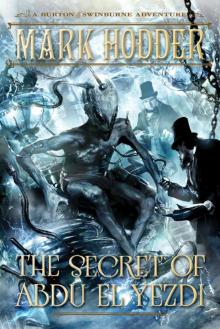 The Secret of Abdu El Yezdi
The Secret of Abdu El Yezdi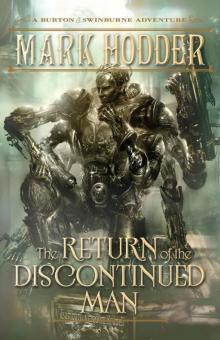 The Return of the Discontinued Man
The Return of the Discontinued Man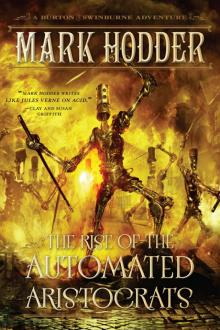 The Rise of the Automated Aristocrats
The Rise of the Automated Aristocrats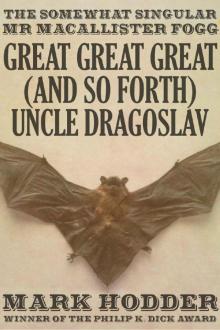 Macallister Fogg 2: Great Great Great (And So Forth) Uncle Dragoslav
Macallister Fogg 2: Great Great Great (And So Forth) Uncle Dragoslav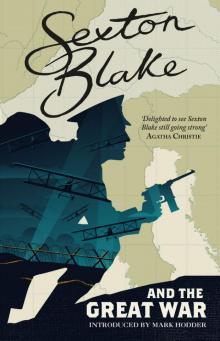 Sexton Blake and the Great War
Sexton Blake and the Great War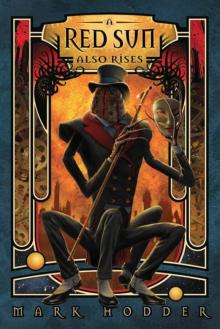 A Red Sun Also Rises
A Red Sun Also Rises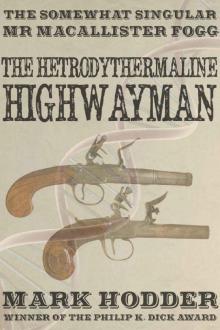 Macallister Fogg 3: The Hetrodythermaline Highwayman
Macallister Fogg 3: The Hetrodythermaline Highwayman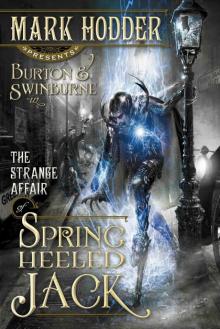 The Strange Affair of Spring Heeled Jack
The Strange Affair of Spring Heeled Jack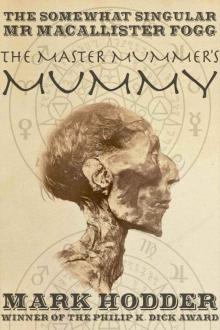 Macallister Fogg 1: The Master Mummer's Mummy (The Adventures of Macallister Fogg)
Macallister Fogg 1: The Master Mummer's Mummy (The Adventures of Macallister Fogg)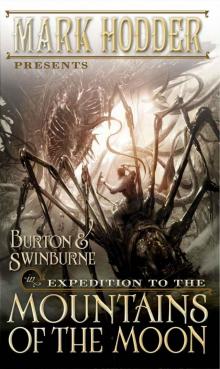 Expedition to the Mountains of the Moon bas-3
Expedition to the Mountains of the Moon bas-3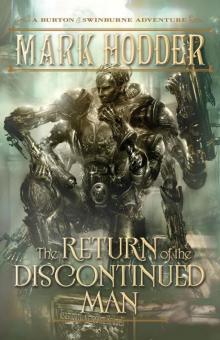 The Return of the Discontinued Man (A Burton & Swinburne Adventure)
The Return of the Discontinued Man (A Burton & Swinburne Adventure)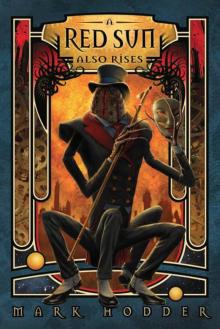 Red Sun Also Rises, A
Red Sun Also Rises, A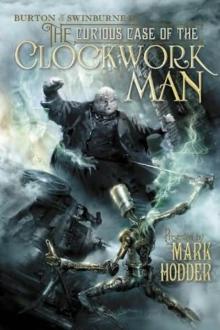 The curious case of the Clockwork Man bas-2
The curious case of the Clockwork Man bas-2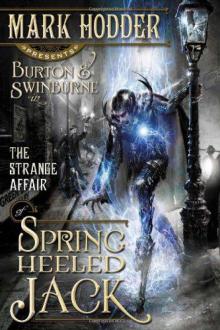 The strange affair of Spring-heeled Jack bas-1
The strange affair of Spring-heeled Jack bas-1